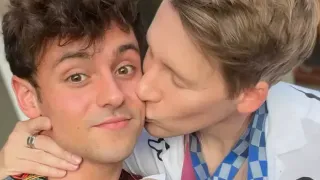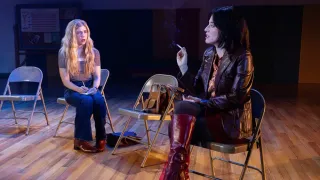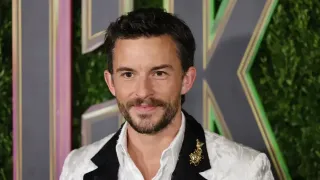May 22, 2024
Queer Love Behind Bars – Star & Director of 'The Lost Boys' Discuss Their Recently-Released Prison Drama
Frank J. Avella READ TIME: 13 MIN.
Belgian helmer Zeno Graton's exceptional first feature "The Lost Boys" ("Le Paradis") is set almost entirely inside a youth detention center and evokes non-conformist cinema such as Stuart Rosenberg's 1967 gem "Cool Hand Luke" and Milos Forman's seminal 1975 classic "One Flew Over the Cuckoo's Nest." As with "Cuckoo's Nest," the audience may feel trapped inside the facility along with the gaggle of "lost boys" longing for liberation from the antiquated rules that govern them, but fearful of what actual freedom might mean.
The incisive narrative (script by Graton and Clara Bourreau) centers on an Arab boy, Joe (Khalil Gharbia, so sexy in François Ozon's "Peter von Kant"), who is excited about his imminent release until tattoo artist William (Julien De Saint-Jean, a revelation) is admitted to the compound. Sparks soon fly between the two boys (in secret, of course), and they must navigate certain realizations that may force them apart. De Saint Jean, with his brooding good looks and understated, yet potent and passionate, performance, proves to be a sizzling new cinematic force.
In addition to "The Lost Boys," De Saint-Jean is also prominently featured in Olivier Peyon's "Lie with Me" (currently streaming), a film that examines the heartbreaking and destructive power of shame and internalized homophobia. Both films were LGBTQ+ festival darlings.
De Saint-Jean will next be seen in the French blockbuster, "The Count of Monte Cristo," premiering in Cannes, later this month.
According to the website JustWatch, "The Lost Boys" is available to rent, buy or download at Apple TV, Vudu, Google Play Movies, and YouTube.
EDGE had the pleasure of chatting with De Saint-Jean and Graton, separately.
Part One: A Conversation with Actor Julien De Saint-Jean
EDGE: One of the refreshing things about "The Lost Boys" is that it's a gay love story with very little inhibitions regarding the boys' sexual orientations. It's just that they're in the corrections facility, and that's not the proper place to display this kind of passion.
Julien De Saint-Jean: Yeah, exactly. [Director] Zeno always told us when we were preparing the movie, [we'd] be showing something utopic... And I thought it was a really great point of view. Because now, in 2024, the love between two boys or two girls is more accepted... It's not even a problem anymore. Just two people loving each other.
EDGE: Can you share when and why you wanted to become an actor?
Julien De Saint-Jean: My mom put me in theater class when I was maybe six... I was wanting to be a director. At 15 years old, I entered the Conservatory of Dramatic Arts of Film. And normally, to go there, you're supposed to have your exam at 18. I managed to [get] in... If you want to be an actor in France, at least in theater, you need to [attend] the National Schools of Theatre Arts, so when I was 18 I entered one in Paris. And, after, I went to another school... And online I found an audition for a movie for Channel Two... And I actually [got] the job. The next day I had an agent, and three months later I had auditions for "Le Paradis/The Lost Boys" and "Lie With Me."
EDGE: Which came first?
Julien De Saint-Jean: It was actually at the same time. It was crazy... We started shooting "Lie With Me" three days in September. I shot all of "Le Paradis/The Lost Boys" in October. And I finished "Lie With Me," right after that. That's why I have a buzz cut for both movies! I was not supposed to. I was really lucky to [have] great directors.
EDGE: They're two very different performances. The one thing they have in common is this refreshingly subtly.
Julien De Saint-Jean: Thank you... In France, you're chosen because you are the character. But I am really far from the anger, the roughness of these characters. I am more gentle... So, I bring a bit of me to those characters. Zeno liked that about me. To not be this dominant, bad guy in a prison. To have this vulnerability. To show all the scars... he suffered, but [with] Joe, he can just have a little shoulder to rely on.
EDGE: Seems silly to ask this in 2024, but did you have any apprehension about playing two queer parts back to back?
Julien De Saint-Jean: That's funny, because a lot of people asked me that when I was in San Francisco at the Frameline Festival. Actually, that was a common question in every festival. The two movies had been sent to the same festivals...
At one point, when I had the opportunity to do the two movies, I asked my agents if I should cancel one and just do one. And thank God I didn't, because I'm so happy to have been part of the two movies... Of course I was scared to be typecast, because sometimes producers or directors, if they know you're good in something, will put you in the same box all the time. And I'm an actor and I want to do different roles. But I'm so grateful to have been part of [both], and I would have been really dumb to cancel one of them.
EDGE: I think there's little danger of your being typecast. It's more that now you're going to find yourself an instant queer film celebrity.
Julien De Saint-Jean: Yeah, I think the industry has changed. And the world has... There's more queer visibility in media and movies. There are so many more roles and characters and stories. So, these won't be the last gay characters or queer characters I will do in my career. And that's great. And I'm going to do so many straight roles, as well. There's so much diversity in stories in cinema.
EDGE: Let's talk a little bit about William. He's introduced to the audience as someone who's pretty fucked up. "He stabbed a guy," is what we hear even before we see him. It's deceptive, because William is really quite sensitive.
Julien De Saint-Jean: Yes. I mean, you maybe notice in the movie there's no explanation, mostly, about our characters. Zeno, when he made the edit, thought it would be less interesting to know why they were there... When I arrive [onscreen] with all the tattoos, the sharp face, you think, "Okay, he's gonna be so dominant and rough." And when he finds love, and intimacy with a guy – just to find someone that he can trust, like, as family – you see all this tenderness and deconstruction of the figure of what a guy in prison would look like, would feel like.
EDGE: The chemistry between you and Khalil is pretty palpable. Did you guys have a rehearsal process?
Julien De Saint-Jean: Yes, we did. Since it was Zeno's first film, he wanted everything really prepared before the shoot. I was booked first. Two months later I had to do auditions with, like, six Joes to find a match. And with Khalil, something happened... It was instant. And it worked. And with Zeno, we went to Brussels in Belgium, for a week to rehearse, to talk about the roles. We had homework to find music that we can relate to the characters. I really enjoyed that part where we create the roles. After, when we were on set, we didn't have to think. It was just natural. We had a week together, the two of us, at the hotel. We went [to] dinner. We talked about our lives. We became friends. So, it was easier to do intimate scenes, create something on set. It was nice.






